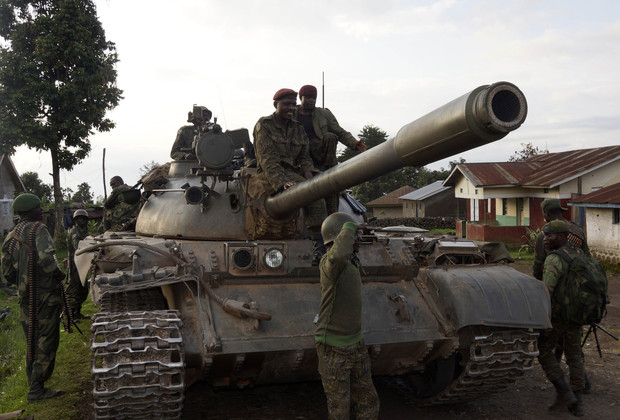DR Congo: M23 rebels close to defeat after US and Britain urge Rwanda to stay out

|
|
|
Foreign ministers of America and Britain called president of neighbouring Rwanda to ask him to cut ties with rebels
Rebels in the Democratic Republic of Congo are close to defeat after the foreign ministers of both America and Britain called the president of neighbouring Rwanda and urged him not to intervene to support them, The Daily Telegraph has learned.
John Kerry, the US secretary of state, and William Hague, the Foreign Secretary, telephoned Paul Kagame separately last Friday and told him to stay out of the conflict.
RELATED ARTICLES
Congo's M23 guerrillas were powerful enough just a year ago to capture Goma, the largest city in the east. But they are now facing military collapse after a week of fighting.
The United Nations has accused Rwanda of supplying the rebels with weapons and ammunition - and even deploying combat troops in their support.
This helped them to seize Goma, a city of almost one million people, and hold it for several weeks in 2012.
 Congolese soldiers rearm as they arrive in Bunagana, north of Goma (REUTERS)
Congolese soldiers rearm as they arrive in Bunagana, north of Goma (REUTERS)
But Mr Kagame, a close ally of America and Britain, has come under intense pressure to cut his links with M23. This appears to have had an effect: Rwanda seems to have stayed out of the recent fighting, helping to explain why M23 has suffered a series of defeats, losing a string of towns to Congo's national army.
Jason Stearns, an expert on Central Africa, said that Mr Kerry rang President Kagame to "impress how important it was for Rwanda to sit this out". He added: "While similar pressure has been applied before — President Obama called his Rwandan counterpart with a similar message last December — this time it may have just been the final straw for the Rwandan leaders."
A Foreign Office spokesman confirmed that Mr Hague also spoke to Mr Kagame on the same day to urge "restraint in relation to the renewed fighting" in Congo.
Last month, the US cancelled some new military aid for Rwanda because of its alliance with M23, which is accused of recruiting child soldiers. Britain and other Western donors stopped bilateral aid for Rwanda's government for the same reason last year.
The most recent offensive began last Friday when Congolese army units, aided by UN peacekeeping troops, advanced into territory north of Goma held by M23. Beyond the lack of Rwandan interference, an overhaul of Congo's notoriously ill-disciplined army was a key explanation for the mission's success, added Mr Stearns.
A new regional commander, Major-General Bahuma Ambamba, has boosted morale by improving training and paying soldiers' salaries on time.
The UN also has a new Force Intervention Brigade with a robust mandate allowing them to take the offensive. This supported the Congolese troops with helicopters and infantry units.
The offensive began with the explusion of the rebels from the towns of Kibumba, Rutshuru, Kiwanja and Rumungabo, all situated on a 60-mile stretch of highway heading north from Goma.
By Wednesday, the M23 had been forced out of Bunagana, their operational headquarters near the border with Uganda.
The rump of the rebel force is now thought to be contained in a small area of rainforest where Congo, Rwanda and Uganda meet. Gerard Araud, the French Ambassador to the UN, said the Security Council had been briefed that "we are witnessing the military end of the M23".
The complete destruction of the rebels remains unlikely, however. "Politically, it will be important to bring what's left of the M23 back to peace talks so that a final negotiated treaty can be hammered out to try to lock them into a permanent ceasefire," said one Western diplomat in Rwanda's capital, Kigali.
The guerrilla movement - named after the failure of a previous peace agreement signed on March 23 2009 - was formed when soldiers mutinied in April 2012. They were largely drawn from the same Tutsi tribe as Rwanda's president and leadership. M23's military aim appeared to be to control territory previously held by a rival rebel group, the FDLR, originally led by Rwandan Hutus who carried out the genocide in their homeland in 1994. The rebellion soon became an effort loot the mineral riches of eastern Congo.
|
|
|

